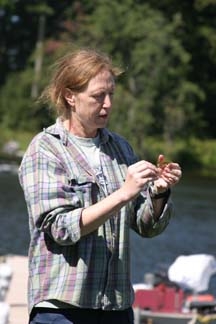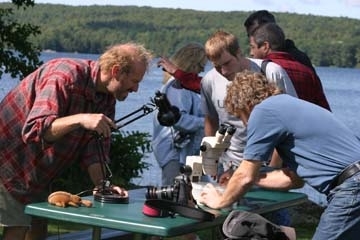Milfoil munching weevils prove their worth at Fairfield Pond

MIDDLEBURY, Vt. ? At Fairfield Pond, on a beautiful sparkling Saturday morning this past Labor Day weekend, Middlebury College Biology Professor Sallie Sheldon had reason to feel optimistic. Sheldon, along with a group of Fairfield Pond Recreation Association members, gathered to review progress made by what may be the smallest and most effective weapon in the fight against Eurasian water milfoil. It’s a humble aquatic weevil - about one half the size of a grain of rice - that lives to eat nothing but the invasive milfoil.
The news is good, according to Sheldon. Now two years since the native weevils were introduced into the pond, the milfoil is retreating. The weekend gathering - complete with microscopes and accommodating weevils - was hosted by Fairfield Pond Association President Bruce Collopy and his wife, Sally Ann, who organized the effort to introduce the beneficial insects into the pond.
Sheldon pointed out beds of milfoil that were once so thick they blocked light and disrupted fish habitat, but now have started to thin and collapse as the weevils damage the stems. In some stretches of the pond that were previously covered with milfoil, native plant species have reclaimed their habitat. Less obvious but still encouraging are the milfoil beds that, while still thick with vegetation, have failed to bloom, meaning the plants are damaged.

“The weevils are a great way to help control the milfoil, but it’s a solution that requires patience,” Sheldon said. To the residents of Fairfield, it’s a wonderful alternative to the standard options of back-breaking weeding, herbicides with harsh side effects, or mechanical harvesting which can hasten the spread of the weeds.
Sheldon has a keen interest in the success of these unlikely heroes. She has been studying the relationship between weevils and milfoil for more than 17 years and received multiple grants from the State of Vermont, via the United States Environmental Protection Agency, in the 1990’s to fund her research. Having demonstrated their effectiveness for controlling milfoil, Sheldon and Middlebury then licensed the weevil growing and distribution process to EnviroScience (http://www.enviroscienceinc.com), an Ohio-based company. EnviroScience has used the weevils in a program it dubbed “MiddFoil” to help control weeds in more than 100 lakes and ponds in 10 states and two Canadian provinces.
In 2005, Sheldon and two student researchers spent part of their summer growing the Fairfield Pond bugs - Euhrychiopsis lecontei, a native to North American waters - in tanks in the greenhouse attached to Middlebury’s Warner Hall. That first year, Sheldon added nearly 9,000 weevils to Fairfield Pond and 28,000 more in 2006.
With the promising results at Fairfield Pond, Sheldon and the Fairfield residents hope the project will inspire other lake associations throughout the state to launch their own weevil projects and take advantage of this innovative process that began at Middlebury.

